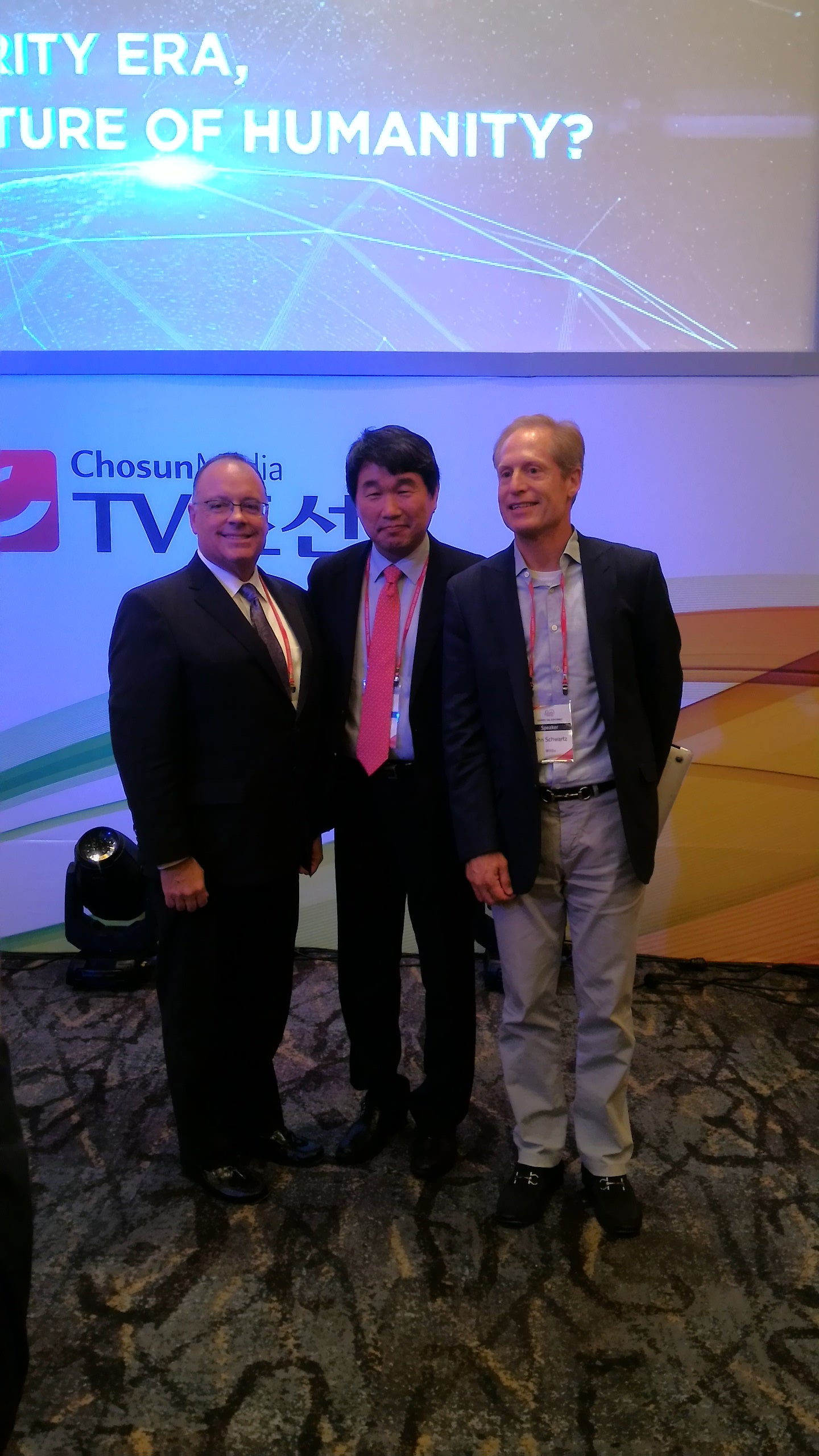Global leaders learn how ASU embraces emerging challenges at South Korea forum

R. F. “Rick” Shangraw Jr. shared ASU's vision for evolving higher education in an era of rapid technological change at the Global Leaders Forum in South Korea. This year’s forum focused on “technological singularity,” the idea that rapidly developing artificial intelligence will outpace our capacity to manage it and trigger unforeseen changes to human civilization.
Leaders seeking to understand a world transformed by technology learned how Arizona State University — ranked number one for innovation for three consecutive years by U.S. News & World Report — is reshaping higher education when ASU Enterprise Partners Chief Executive Officer R. F. “Rick” Shangraw Jr. shared the university's vision at South Korea’s Global Leaders Forum, the country’s premier international assembly for addressing pressing societal issues.
Drawing on his decade-long experience shaping university strategy as part of ASU’s executive team, Shangraw focused on how higher education will evolve over the next ten years and how leaders can address emerging challenges and opportunities.
He was part of a panel that included Ju-Ho Lee, former South Korean minister of education, science, and technology; Jae Sung Lee, vice president of the Ulsan National Institute of Science and Technology; Hye Ri Baek, cofounder of SEED CO-OP; John Schwartz, head of enterprise business development at edX; and Sohail Inayatullah, UNESCO chair for future studies.
Shangraw shared that:
• Colleges and universities are being forced to rethink what and how they teach — known as “instructional design” — because some students arrive on campus highly proficient in technology and demand digitally immersive learning environments; yet others are underprepared and need remedial courses and counseling.
• Life-long learners of all ages will seek to engage with colleges and universities to learn about a wide variety of subjects. A recent survey by the Pew Research Center found 73 percent of Americans view themselves as life-long learners.
• Faculty will become increasingly interdisciplinary, often holding degrees in multiple subjects. They’ll be globally connected through sophisticated communication networks.
• The nature of research will change as faculty have ubiquitous access to datasets and methods.
• The nature of teaching will change as faculty interact with hundreds of students through digital learning platforms. More part-time, non-tenured instructors will teach these courses, creating a divide between faculty who both teach and conduct research and faculty who exclusively teach or conduct research.
• Technology is spurring advances in learning analytics, virtual reality as a learning tool, voice-activated learning technologies, and the creation of lifetime digital knowledge portfolios.
• Technology is transforming infrastructure and administration. For example, ASU’s newest residence hall is equipped with Amazon Echo devices programmed to ASU-specific information, including course content.
• Financial models for higher education are shifting. Universities are diversifying revenue streams as government support shrinks and students struggle with tuition costs. Public-private partnerships, common for parking, residence halls, food service, will grow to include sophisticated models for student, career and enrollment services.
R. F. “Rick” Shangraw, CEO of ASU Enterprise Partners; Ju-Ho Lee, former South Korean minister of education, science, and technology; and John Schwartz, head of enterprise business development at edX shared with members of the Global Leaders Forum how to embrace changes that will transform higher education.
ASU’s strategy to manage change has focused on strengthening its “knowledge core” — the heart of all major research universities. Comprised of basic research, applied and translational research, inventions, libraries, living-learning facilities, and research facilities, the knowledge core allows the ASU community to create, store, synthesize, analyze, and share knowledge.
It is vital to ASU’s long-term success and must never be compromised, Shangraw said.
Around that core is the evolving campus learning environment. Over the next decade, ASU will advance next-generation digital learning spaces to augment traditional physical classrooms; develop artificial intelligence-based advising and tutoring platforms, and personalize learning at scale.
“We’re not far from the time when everything you studied or learned inside and outside of the classroom will be stored in a personalized digital portfolio for easy reference,” said Shangraw, who, from his current position as CEO of the private, non-profit Enterprise Partners, oversees efforts to raise, create and invest resources for ASU.
Next, ASU will continue to develop digital support for online learning. ASU has one of the largest platforms for a public university with more than 30,000 online students.
ASU will also embrace lifelong learners eager to expand their knowledge and gain new skills. It seeks innovations in content delivery and learning pathways unimpeded by organizational constraints.
Finally, ASU is working on creating fully personalized learning platforms. Learners will be able to take knowledge and skill gained in one adaptive course and transfer it to the next. To advance this model, ASU seeks innovations in virtual reality learning, advanced group learning, and tools to integrate individual learning across life stages.
The most successful colleges and universities will embrace these four realms, Shangraw said.
Learn more at asuenterprisepartners.org.
More Local, national and global affairs

Arizona PBS is now free to stream for Prime Video viewers in the US
Arizona PBS is now available for streaming on Amazon Prime Video. A new partnership between PBS and Amazon brings the station’s…

First-ever Taiwan Symposium at Thunderbird celebrates business, cultural connections
The investment by TSMC and other Taiwanese corporations in Arizona will reap dividends not only in thousands of new jobs but also…

Study shows that trust drives successful market economies — but not in the way you may think
From fueling our cars to fulfilling daily coffee habits, the average U.S. cardholder makes 251 credit card transactions per year…


